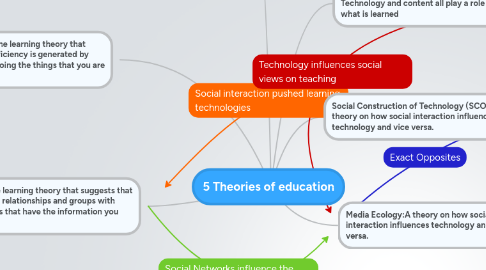5 Theories of education
by david wood

1. Connectivism: The learning theory that suggests that learning is forming relationships and groups with people or networks that have the information you need
1.1. Capitalizes on the use of search engines and social media
1.2. Has grown in popularity since the start of the digital age.
1.3. Implications is more technological integration in the classroom
1.4. Some criticisms is that it is "who you know" instead of "what you know"
2. Constructivism: The learning theory that suggests that proficiency is generated by experiences and doing the things that you are studying.
2.1. Doing the activities helps the process of learning
2.2. The motivation behind every "lab" and "experiment"
2.3. student participation is the driving force behind learning
2.4. One criticism is that it is a lot more difficult to organize and much more expensive style of learning.
3. Cognitive load: The theory that learning needs to be balanced between too much information and difficulty or too little in the wrong circumstances. If the learner is either too stressed by new concepts, or to bored with not enough difficulty, Learning will not take place. From now on simplified "CL"
3.1. Extraneous CL: Refers to the environment of learning. Everything from place of study, materials of study, and pedagogy of the Teacher.
3.2. Intrinsic CL: Refers to the inherent difficulty in the material being taught. Teaching a student how to add 5+5 is considerably easier then teaching them differential calculus and so on.
3.3. Germane CL: Refers to the connections that learners make to other fields of study and knowledge. Math and Science are often paired together as are the Liberal Arts
4. Social Construction of Technology (SCOT): A theory on how social interaction influences technology and vice versa.
4.1. Social interaction influences our technology not the other way around.
4.2. An example of this would be SMS and email messaging. These grew out of a social want to communicate easily over long distances
5. Media Ecology:A theory on how social interaction influences technology and vice versa.
5.1. Social interaction is influenced by technology and not the other way around
5.2. An example would be Facebook and twitter that changed the way we communicate.
6. TPACK: Theory that Pedagogy, Technology and content all play a role in what is learned
6.1. Newly developed as it added the "T" to the spectrum.
6.2. Brought everything that teaching required into a concise, usable theory.


